8 key issues faced by church leaders of our youth today: FOPx research project
by Gracia Lee // October 27, 2023, 2:20 pm

Photo by Albert Vincent Wu on Unsplash.
How can we make the Bible relevant to youth in today’s culture?
Can we reinvent the way we disciple our young people?
How can we get more of the Church to be involved in raising up the next generation?
“The youth ministry does not belong to the youth alone. Youth need role models, otherwise they feel alone sometimes.”
These are some of the questions leaders of the youth in church are asking today, according to findings by a research project by FOPx, the youth wing of Festival of Praise.
Named An Inter-church and Inter-denominational Look at the Needs of our Youth Ministries, Pastors and Leaders in Singapore, the project sought to understand the challenges that youth pastors and leaders face in discipling youth today, as well as to come up with solutions to equip churches and youth ministries.
Over a year and a half, FOPx, which is helmed by a team of seasoned youth pastors, conducted in-depth user interviews and an online survey with the help of an independent design-thinking firm.
A total of 24 people from different denominations and youth ministry sizes were interviewed for the interviews. Six were senior pastors, 17 were current or former youth pastors and leaders, while one was a youth trainer.
For the online survey, there were 326 respondents from churches of varying denominations and sizes. Of the respondents, 76% were youth leaders, 12% were youth pastors and 8% were senior pastors.
What youth pastors and leaders say
From the responses collected, researchers identified eight challenges common across youth ministries and churches today. The findings were released publicly on Thursday (October 26) online.
1. They struggle to disciple youths in a complex world
What they might say: “There are so many complex issues affecting the youth. How can I make biblical truths relevant in today’s culture and context?”
When asked about the main challenges faced by youths that leaders feel ill-equipped to handle, more than 70% of respondents chose “worldly distractions and negative influences from social media” as one of their top three challenges.
Other common challenges were “a more secularised society and rejection of spirituality” (69%) and “difficulty addressing tough/ sensitive topics” (52%).
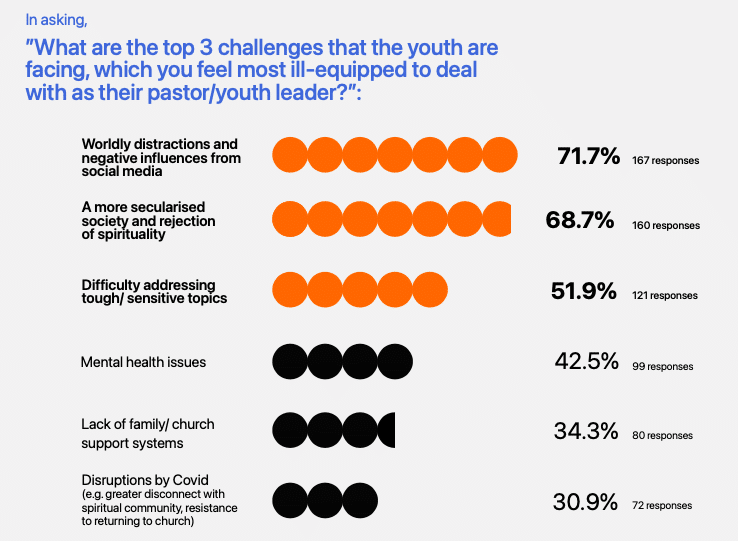
Across the board, the greatest two challenges faced by leaders of youth were “worldly distractions and negative influences” and “more secularised society and rejection of spirituality”.
When asked to rank a list of challenges they face in engaging and discipling the youth, respondents ranked “dealing with increasing secularised and polarised worldviews” as their top challenge, followed by “dealing with more individualised and sceptical mindsets”.
Reflecting on these survey results, researchers wrote: “In discipling youth on some of these more complex issues, youth pastors and leaders need space and know-how to engage youth in discussion and dialogue beyond just downloading to them a set of responses to follow.”
2. They lack a strong support system
What they might say: “The leadership journey can get quite lonely as I have few peers to share my challenges with. Even when I struggle, I’m not sure who I can talk to.”
When asked to rate the strength of their personal support networks, about 1 in 4 youth leaders and pastors gave a rating below five (out of 10).
This suggests that many are struggling with the challenges of leadership alone.
The top personal challenge for respondents was the “lack of time and difficulty in prioritising various work and life commitments”; 80% chose this option among their top three personal challenges.
Other common personal challenges were “connecting with and discipling the next generation” (68%) and “coming up with programmes and content” (55%).
Over 90% of respondents also said that they found it challenging to manage their commitments at least occasionally.
When asked to choose their top three challenges in managing their commitments, the following choices ranked the highest among all respondents:
- Burden of responsibility and guilt for not doing enough (81.2%)
- Drawing boundaries between work and rest to avoid burning out (75.7%)
- Maintaining your own spiritual growth even as you serve (74.2%)
- Managing personal relationships with people under your charge (68.9%)
About 30% of youth pastors and leaders said the number one way they would like to be supported by the Church is to be given safe spaces to make mistakes, learn and grow.
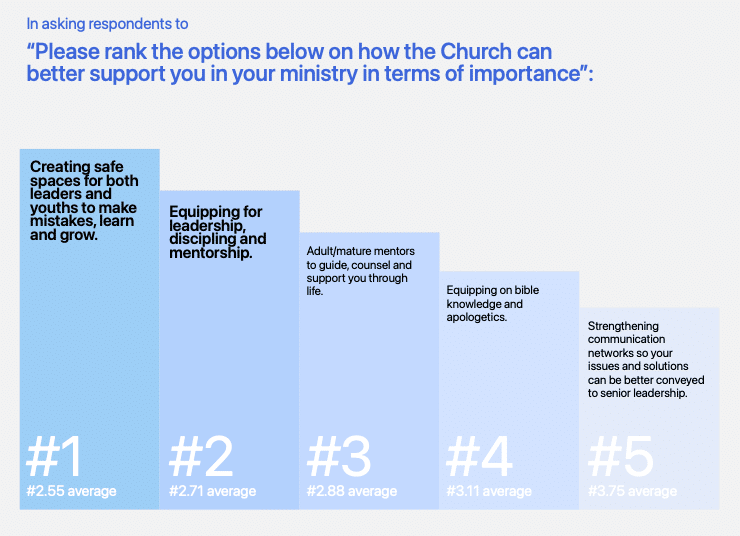
According to researchers, a larger proportion of youth leaders picked “safe spaces” as their first choice compared to senior pastors.
3. They want more guidance on how to lead their youth effectively
What they might say: “I want to give my best for the youth, but I’m not always clear how to do this effectively and can feel overwhelmed trying to lead beyond my capacity.”
When asked how motivated or passionate they are in serving the youth at the moment, around 15% of respondents gave a rating of 0 to 5.
When asked why, four key factors stood out:
- Discouragement due to the lack of growth and fruit
- Busyness and exhaustion from balancing life and ministry
- Difficulty engaging the youth
- Issues with maintaining personal spiritual growth
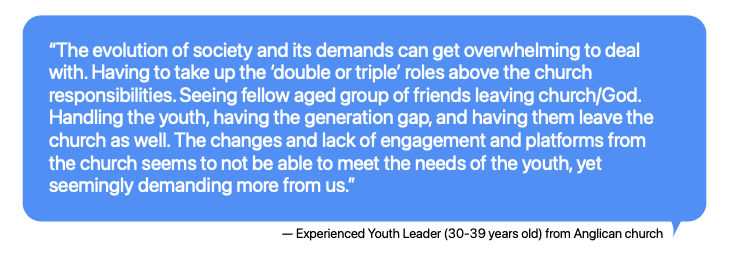
A youth leader shared the pressures he faces in his role.
Close to 40% of all respondents indicated that they desired more spiritual guidance from experienced mentors, while more than 77% indicated that there is a need for effective mentorship of youth leaders through intergenerational support networks.
4. They struggle to navigate the gap between the younger and older generations
What they might say: “I need to know how to better communicate the changes we make in the youth ministry to different stakeholders, as we need their blessing and support for the changes to be successful.”
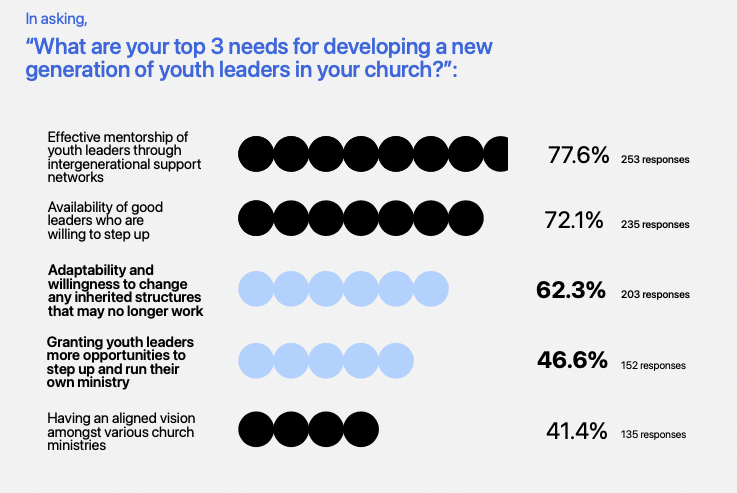
Youth pastors and leaders put more emphasis on “adaptability and willingness to change” compared to senior leadership, noted researchers.
“We are dealing with a generation gap, and a generation gap is often a communication gap,” said one youth pastor.
About 60% of youth pastors and leaders said one of their top three needs to develop a new generation of youth leaders in their church is adaptability and a willingness to change old structures that no longer work.
Close to 45% of the same group also said that youth leaders need more opportunities to step up and run their own ministries.
5. They desire a safe space to try out new things
What they might say: “I wish I had more space to experiment with how to do youth ministry without the pressure of getting it right the first time.”
When asked how the church can better support them in their ministry, more than 30% of youth pastors and leaders picked “creating safe spaces for both leaders and youths to make mistakes, learn and grow” as their top choice.
Youth leaders the research team spoke to also said they desire more space to find their own expression of leadership, and felt that there is a lack of diversity in the way things are currently done.

Younger leaders said they are open to trying new ways of doing ministry and comfortable with failure.
One seasoned youth pastor in his 30s said: “I do wish the older generation in my church would recognise that times have changed, and the values and what the youth want/expect from the church is very different from their time.
“I wish they would take the time to listen and understand more, not presume they know what’s best for the youth, and be willing to change, adapt and evolve where necessary.”
6. They want to build stronger spiritual foundations for their youths
What they might say: “I need more effective and engaging ways to build spiritual foundations in my youth so they are excited to grow deeper in the faith.”
When asked what needs to be done more to increase the success of their youth ministries, more than 8 in 10 young pastors and leaders chose “taking time to build strong spiritual foundations in the youth”.
“Youth ministry is a place to lay lifelong foundations for discipleship so that when the person enters adulthood they are in a strong position to engage with the trials and temptations of life,” said one senior pastor.
More than 70% also chose “focusing on discipling individual lives instead of programmes and events”, while 64% said “simple acts of care and love”.
One experienced youth leader under 25 said: “The main thing I’ve seen that changes students’ lives is discipleship. I’ve seen 15-year-old girls go from suicidal to wanting to preach God’s Word just because someone was willing to listen to them through everything.
“One-to-one discipleship changed my life and I’ve seen it change many more.”
7. They want to partner parents to disciple the youth
What they might say: “Understanding a youth’s background and family is critical in discipling him/her. I want to – but don’t know how to – connect with my youth’s parents.”
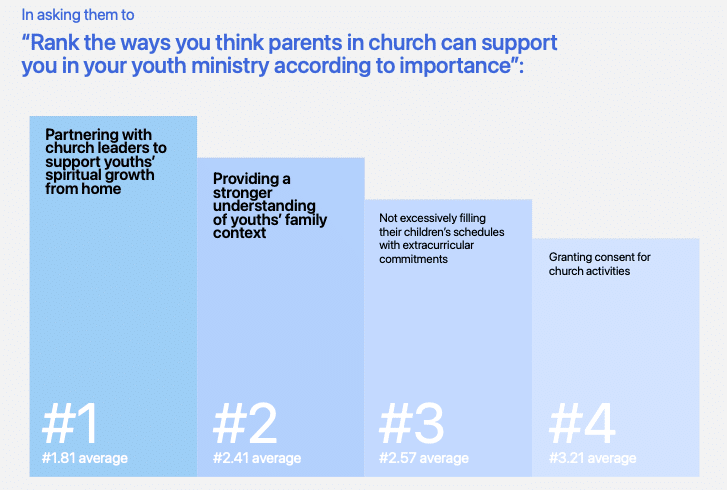
These were the top ways respondents wanted to be supported by parents of their youth.
When asked how parents can support them in their youth ministry, respondents generally ranked “partnering with church leaders to support youths’ spiritual growth from home” as the top choice.
This suggests that it may be helpful for church leaders to organise more frequent and purposeful engagements with parents of youth, to discuss how best to disciple their children in church and at home, researchers said.
8. They hope the whole church can be involved in discipling the youth
What they might say: “I want to see more of our older congregation members taking up the challenge to be spiritual parents of our youth.”
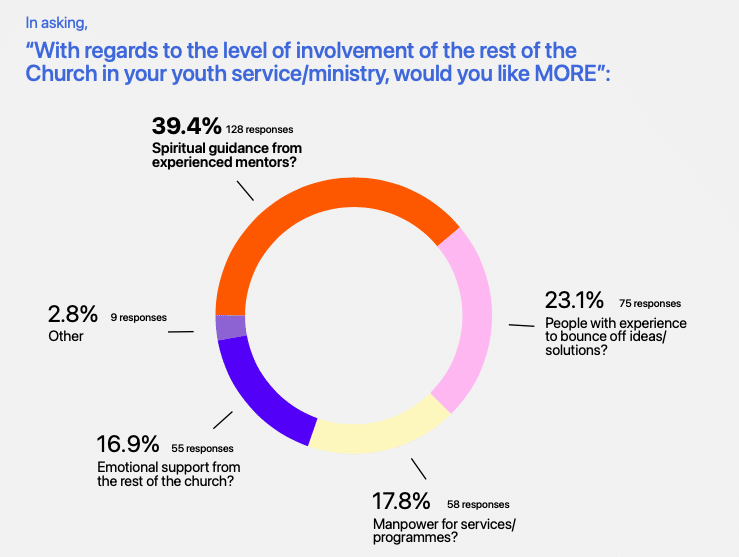
“Spiritual guidance” was prioritised more highly for youth leaders and pastors than senior pastors, said researchers.
Close to 40% of respondents said they would like more spiritual guidance from experienced mentors outside of the youth ministry, while close to 25% said they would like more experienced people with whom they can bounce off ideas and solutions.
One senior pastor said: “The youth ministry does not belong to the youth alone. We need people from my generation to be spiritual fathers and mothers. Youth need role models they can look up to and rely on, otherwise they feel alone sometimes.”
A youth leader in his 20s added that he hopes adult leaders can take time to invest in the lives of the youth “rather than just dumping the responsibility to the youth leaders”.
RELATED STORIES:
10 causes of concern for the Church: What surprised us from the Pew Research religious survey
We are an independent, non-profit organisation that relies on the generosity of our readers, such as yourself, to continue serving the kingdom. Every dollar donated goes directly back into our editorial coverage.
Would you consider partnering with us in our kingdom work by supporting us financially, either as a one-off donation, or a recurring pledge?
Support Salt&Light



